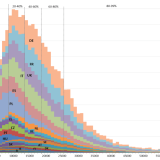
Dobře fungující a inkluzivní trhy práce
Dobře fungující trhy práce jsou předpokladem pro plné využití potenciálu hospodářství v oblasti tvorby pracovních míst v době, kdy se vzpamatovává z finanční a hospodářské krize. Důsledky krize na trh práce v členských státech EU se velice liší, přičemž některé skupiny, jako jsou mladí lidé a lidé s nízkou kvalifikací, byly zasaženy obzvlášť tvrdě. Rychle probíhající strukturální změny také přinášejí nové problémy, co se týče možného nedostatku pracovní síly a nesouladu mezi nabízenými a požadovanými dovednostmi v různých odvětvích a regionech.
Hlavním nástrojem EU na podporu zaměstnanosti a sociálního začleňování je Evropský sociální fond, který pomáhá lidem získat práci, slouží k integraci znevýhodněných osob do společnosti a zajišťuje rovnější životní příležitosti pro všechny. Existují též rozsáhlé evropské právní předpisy, které upravují práva pracovníků na trhu práce. V dubnu 2017 navíc Evropská komise spustila evropský pilíř sociálních práv. Pilíř vychází ze sociální a zaměstnanecké politiky EU a doplňuje ji a jeho cílem je být vodítkem pro politiky v řadě oblastí nezbytných k zajištění dobře fungujících a spravedlivých trhů práce a systémů sociálního zabezpečení.
- Evropská komise: Evropský sociální fond
- Evropská komise: Evropský pilíř sociálních práv




























